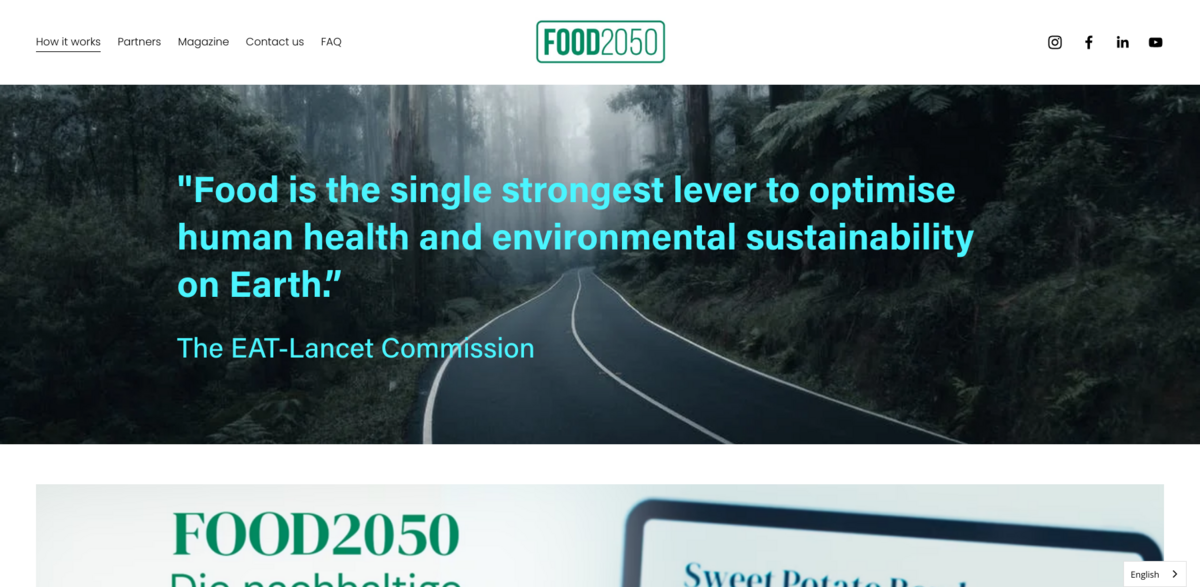What is FOOD2050?
FOOD2050 is a digital food guidance system designed specifically for food service businesses. It helps these businesses create and communicate sustainable and healthy meal options by providing transparency on the nutritional and environmental impact of meals. At its core, FOOD2050 supports personalized food choices for consumers, making it easier for them to pick meals that align with their health goals and sustainability values. The platform is built on the principles of the Planetary Health Diet, which balances human nutrition with environmental sustainability—think plant-based proteins, whole grains, and responsible sourcing, all while minimizing food waste and high-emission ingredients.
Main Benefits of FOOD2050
FOOD2050 offers a powerful solution for food service businesses facing rising costs, evolving consumer demands, and increasing regulatory pressures. Here’s what it brings to the table:
- Helps reduce environmental footprint by analyzing meal sustainability, ingredient sourcing, and CO₂ emissions
- Enables informed decisions on menu design and operational sustainability
- Supports alignment with global health and climate goals
- Provides transparency on nutritional balance and environmental impact
- Offers personalized meal recommendations based on dietary preferences, allergies, and sustainability concerns
- Seamlessly integrates with existing food service workflows like recipe tools, digital menu boards, and mobile apps
- Automates data collection and reporting without manual input from operators
How FOOD2050 Evaluates and Communicates
One of the standout features of FOOD2050 is its ability to analyze and evaluate recipe data, creating an extensive database that empowers consumers to make informed choices. But it doesn’t stop there. The platform covers all essential touchpoints in the customer journey, guiding consumers in their food choices while enabling businesses to align their processes with sustainability and health goals. From digital labels and menu descriptions to interactive displays, FOOD2050 educates customers on the environmental and health impact of their meals—making sustainability not just a buzzword but a clear, accessible part of the dining experience.
Monitoring Sustainability and Health Impact
FOOD2050 enables food service businesses to measure their climate and health impact transparently and publicly. The platform tracks key sustainability metrics such as CO₂ footprint per meal, water usage, biodiversity impact, and nutritional balance. This data is calculated through a Life Cycle Assessment (LCA) partner, Eaternity, ensuring accuracy and reliability. Real-time dashboards and reports provide insights into total CO₂ emissions from meals served, consumer engagement with sustainable choices, and compliance with nutrition and health targets. Businesses can export these reports for internal use or external sustainability audits—keeping everything transparent and accountable.
Personalized Nutrition and Dietary Support
FOOD2050 isn’t just about sustainability; it’s also about personalization. The system helps consumers make meal choices tailored to their dietary preferences, health goals, and sustainability considerations. Whether someone needs vegetarian options, gluten-free meals, or allergen-free alternatives, FOOD2050 automatically flags meals containing allergens and suggests suitable substitutes. This personalized approach ensures that everyone can enjoy meals that fit their unique needs without compromising on taste or sustainability.
Project Impact and Alignment with Global Goals
- SDG 2: Zero Hunger – Promotes nutritious and sustainable food choices
- SDG 3: Good Health and Well-being – Supports healthier eating habits
- SDG 12: Responsible Consumption and Production – Encourages sustainable food sourcing and waste reduction
- SDG 13: Climate Action – Helps reduce CO₂ emissions from food service operations
- SDG 15: Life on Land – Minimizes biodiversity impact through responsible ingredient sourcing
Getting Started with FOOD2050
Starting with FOOD2050 is straightforward. Businesses can contact the team for a demo and consultation, assess integration needs like POS systems or digital menus, and onboard their teams with support and training materials. Once launched, FOOD2050 runs automatically, tracking the sustainability and health impact of meals without requiring manual data input from food service operators. Plus, with API integrations available, it fits smoothly into existing software ecosystems, making the transition hassle-free and efficient.






















